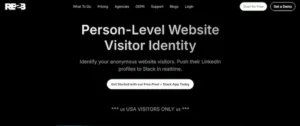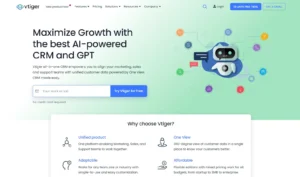Lead Generation for Business Growth: Insights
Exposing your logistics and supply chain company to prospective customers and increasing your reach is essential to business growth.
In that same vein, lead generation is key to making sure your sales pipeline is full and your business is exposed to potential clients and partnerships. Let’s go over the most important information you need to know when using lead generation services for your business.
What is A Lead?
A lead is an individual, business, or entity interested in the services or products your company offers. They are ideally someone who has already expressed an interest in partnering with your business, not just some random person you hope to turn into a customer.
A business typically has to obtain a lead’s contact information through:
- Surveys,
- Mailing lists,
- Trial offers,
- Subscriptions, etc.
Some leads express more interest in your business than others, and distinguishing between the different types of them is an integral aspect of making lead generation work for your company.
Let’s go over some of the more common types:
Cold Leads
Cold leads are not ideal as they are the most difficult to turn into a sales-ready customer. They have not yet expressed any interest in your particular business, but they somehow fit right into the customer profile you’re looking for.
But while cold leads are the most challenging type thus far, they’re also the most common type—making cold calling or other communications a staple in many businesses.
Hot Leads
Hot leads, on the other hand, are individuals or businesses that have already expressed a keen interest in what your company has to offer.
This type comes at a pivotal point in turning leads into sales because you have to grab their full attention while you still have it. Without urgency, hot leads may turn to competitors who can provide them with solutions within a shorter time frame.
Sales-Ready Leads
Sales-ready leads are those who are almost ready to buy your products or avail of your services. At this point in the sales lifecycle, it’s vital to assess if your prospective client has a pain point your company can address and whether the client has the budget to avail of your services.
This type usually only needs a little push before being ready for the next step, which is becoming a sales-qualified lead.
Sales-Qualified Leads
Sales-qualified leads are near the very end of the lead-to-sales pipeline, and they’re the deals you are most likely to close. SQLs are ready to become paying customers, and all that’s left to do is guide them through the sales process.
However, sales-qualified leads still require your immediate attention as they may still be looking for alternatives among your competitors.
Other types include the following:
- Warm leads;
- Service Qualified Leads;
- Information Qualified Leads;
- Marketing Qualified Leads;
- Product Qualified Leads.
What Is Lead Generation?
Now that we know about leads, let’s talk about the next step: lead generation.
Lead generation is the active effort of transforming leads into sales. This can be done by nurturing your potential customers and making sure you’re addressing their concerns and pain points. Nurturing leads can take many different forms, but all have the same goal—to find potential customers and lock them into making a sale.
You can think of lead generation simply as a way of easing potential customers into becoming clients for your business.
How Is Lead Generation Valuable For Business Growth?
In a world of tight competition and saturated markets, lead generation is an exemplary way to set your business apart from others and spur strong business growth.
Lead generation allows your sales team to work more efficiently because closing deals with organically interested individuals is far easier than pursuing dead contacts.
It also grows your business’ reach and exposes your services to more individuals, potentially increasing your company’s market share. Here are more specific ways lead generation can impact your bottom line.
Connecting With Decision Makers
Lead generation services usually include features like connecting you to key decision makers or C-suite individuals. And one of the main things you must understand with logistics and supply chain businesses is that connections are everything.
Lead generation can be crucial to your business because you never know when you will find the client that will lead you to your big break in the industry.
More Customized Content
All lead generation activities start with the same first step: acquiring the lead. They are the blood of lead generation practices, and they’re game changers in business.
Trying to transform potential clients into actual customers requires a certain degree of interest from their end. Employing lead generation services makes this process so much easier.
Part of the reason leads make such good sales converts is that you can easily customize your content to suit their needs.
For instance, you may have secured a lead through a survey where said they talked about their pain points and the type of service they are looking for. Now that you know this information, you can easily tailor your content to match what they need.
Personalized content is more likely to resonate with your target audience, making leads more likely to be interested in what your company has to offer.
Increased YoY ROI
ROI (return on investment) is one of the most reliable metrics for ensuring your company grows as it should. More specifically, it measures how well you are translating investments into actual profit.
Spending money on marketing and lead generation may seem like costly outlays, but the results are often worth it, provided you do things right. Employing lead generation services in your logistics and supply chain business is a great way to increase your annual return on investment, thanks to more closed deals.
Applying Lead Generation To Your Logistics & Supply Chain Business
Targeted Ads
The world is on the Internet. Many sound business strategies that were so fundamental years ago have now become outdated in many industries. Even if your logistics business is more B2B-centered, having an online presence is still vital to your success.
Using targeted ads increases your customer reach and allows you to utilize AI-powered algorithms that show ads to customers who are more likely to be interested in your offers.
Once potential clients see this ad, you can push them to take action by leading them to a social media account or your website landing page—more about this in the next section.
Ideally, you should link them to your social media pages on platforms where you ran the ad. For instance:
- If you’re running the ad on Facebook, the link should also lead to your company’s Facebook page;
- If you’re running the ad on Instagram, the link should also lead to your Instagram profile, and the list goes on.
Today’s ads are much more efficient than they were a decade ago, thanks to AI-powered tools. By utilizing these technologies well, you increase your chances of generating leads that you can eventually convert to sales.
An Engaging Landing Page
- Answering a survey;
- Subscribing to a mailing list;
- Getting a free trial of your services.
- Use local SEO (Search Engine Optimization) to attract local customers;
- Make your content catchy and engaging—lure them in from the start;
- Create content specifically geared towards your target market, not the general public.
Lead Prioritization
Knowing how to prioritize potential customers is essential to good lead generation practice. It saves you time, effort, and the resources it takes to pursue a lead, which may or may not result in a sale.
To illustrate it better, let’s look at the difference between a local business actively searching for a logistics company for their supply chain needs and a startup that fits your customer profile but isn’t exactly looking for the services you offer. Which one do you think your logistics company should pursue?
Clearly, the ideal choice would be the former. Prioritizing the latter would make for a more difficult sales conversion and is more likely to lead to a dead end.
Contests, Giveaways, and Free Trials
Let’s face it, people like free things. And while contests and giveaways may be more challenging to do as a logistics and supply chain company, they’re still doable! Get creative with what you can offer and maybe give out free vouchers or company credit as an incentive.
Doing this is a great way to connect with people who may have an interest in doing business with you. You’ll get their contact information, and you know that one way or another, they seem interested in the services your company offers.
These contests can also spread the word about your business—potentially reaching your target audience.
Common Mistakes Business Owners Make With Lead Generation
Lead generation doesn’t always work for every business owner. Not because there is a fundamental issue with lead generation itself but because there may be problems with how it’s being implemented in the business.
Here are some mistakes you should avoid for your logistics and supply chain company:
Not Attracting The Right Market
One of the main goals of marketing, in general, is to increase the reach of your business. This idea can easily be misinterpreted without some valuable nuance.
Employing lead generation services to the general public is not a wise choice when running a logistics and supply chain company. A much better decision would be to target markets where you know your services will be most valuable: think quality over quantity.
Focusing on value-adding markets may result in lower leads, but they are more likely to translate to actual sales than energy focused on cold calls. The same goes for running advertisements or campaigns in areas out of your scope of service.
Ignoring Your Leads’ Pain Points
One of the pitfalls of being part of a business and marketing a company’s products is that you can get caught up in the thought that you know better—better than your client, at least.
But ignoring your lead’s pain points will not do you any favors. To keep your sales pipeline full, you actually have to take note of their concerns and make sure the services you are offering are solving the issues that are most valuable to your lead.
Not Diversifying Lead Sources
As previously mentioned, one of the very first issues marketers face with lead generation is where to get leads in the first place. After all, there’s no conversion happening if you can’t contact a potential customer.
Another layer to this issue is the lack of diversity when it comes to gathering leads. Many businesses make the mistake of using only one or two lead sources, like social media platforms.
In reality, there are so many more ways you can generate leads, such as the following:
- 3rd party databases;
- Your website landing page;
- Surveys;
- Lead generation forms.
And plenty more.
Making sure you source leads from various sources creates a more dynamic pool of potential customers and thus, a higher conversion rate.





